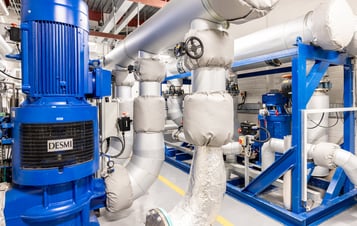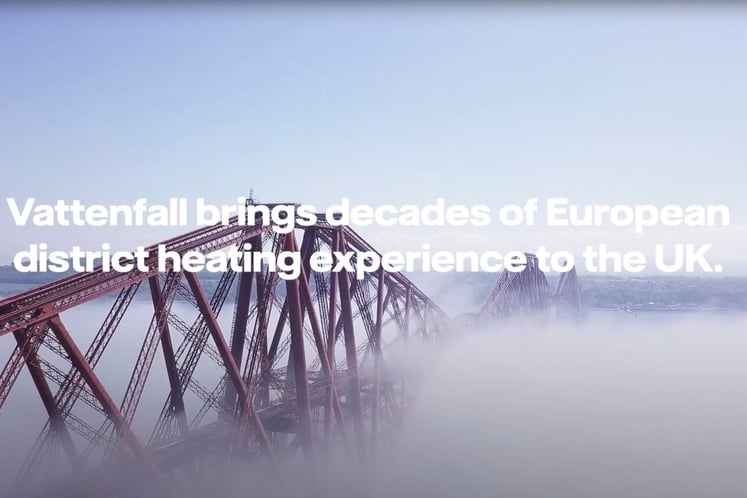The vision for UK heat networks
Heat networks are used in many parts of the world to deliver low carbon heat to homes and businesses.
Only now are large-scale, robust networks beginning to appear in the UK, benefiting from the opportunity to learn from and build on the experience of successful rollouts across Europe. We have a vision for expanding UK district heating and, using our experience in Europe, are committed to leading the way towards zero carbon heating in the UK.
Video player requires marketing cookies.
To view this content please click here to allow marketing cookies.

Bristol
In 2023, Vattenfall Heat UK acquired Bristol Heat Networks Ltd. and is working with Bristol City Leap - a trailblazing large-scale, multi-pronged initiative aimed at achieving carbon neutrality for the city's energy infrastructure by 2030.

London
We are working with Related Argent and Barnet Council in London to design, build and operate a new heat network for one of Europe's largest redevelopments - Brent Cross Town.
With Cory and the London Borough of Bexley, Vattenfall are developing a district heating network designed to heat up to 25,000 homes and businesses over the next 10 years.

Scotland
Midlothian and the Shawfair project represent a gateway to decarbonisation in the Edinburgh area. Supporting progress towards sustainable living within a climate emergency.

The next generation of heat
As heat network technologies continue to evolve, the most advanced technologies, sometimes referred to as 5th generation district heating, combine heating and cooling into a single system.
In 5th generation networks, decentralised heat pumps draw heat from an ambient loop, meaning that excess heat can be removed and redirected to provide heat elsewhere. In this way, the system can provide both heating and cooling.
Another development in heating technology being tested is the 'Internet of heat'. This is the idea that users could both buy and sell heat and energy, allowing consumers to become producers too. This could one day lead to local energy and heat markets, with distributed, decentralised micro-generation that would lower energy bills, increase efficiency and help to provide a sustainable alternative to the fossil fuel industry.

Investing in our future
The provision of heat at scale benefits all; from the policymakers keeping our communities happy and healthy, to the place-makers providing desirable homes fit for the future, and the families enjoying cosy rooms, free from boiler breakdowns and rising bills.
The upfront costs of investing in the necessary infrastructure for tomorrow's heat networks can be shared in line with these benefits for local government, utility companies, housing providers and other investors, working together to realise a fossil-free future.
Initiatives have already been established to facilitate such collaboration, including the Heat Networks Investment Project (HNIP) and the Heat Networks Delivery Unit.
Vattenfall is actively working with the UK government to help devise schemes that will provide financial incentives to developers and local government.
Meanwhile, Vattenfall is supporting the establishment of concession zones in cities that would remove some of the barriers to establishing district heating.
Such schemes are key to overcoming the risks associated with establishing new heat networks, which currently acts as a barrier to realising their potential to deliver low-carbon heat. Retrofitting properties currently supplied by gas, in particular, is expensive. Concession zones can help to reduce the risks associated with implementing a heat network and, as a result, reduce the capital cost. With the right planning and motivation to make it happen, heat networks can serve existing buildings as well as new developments.
Heat network providers themselves also have a responsibility to ensure these large-scale and long-term investments are well set-up to benefit all. At Vattenfall, we invest alongside our partners and provide flexibility in our approach to ensure the right arrangement for each project.

The heat revolution is underway
With over 100 years of history working with local governments to deliver low-carbon heat and energy, and having already invested £3 billion in UK wind power over the last decade, Vattenfall is now bringing its experience and vision to change the face of heating in cities across the UK.
The heat revolution in the UK has begun and Vattenfall is working to accelerate the journey towards fossil freedom.
Britain showed global leadership when the UK government set the pledge to hit net zero by 2050. With careful planning and strong partnerships, it is achievable for heat to go fossil-free within one generation.
We can turn the tide on climate change for the benefit future generations.
Why heat networks?

Most UK homes are heated using natural gas boilers, but there are far more resource-effici...

UK homes are being encouraged to move to low carbon heating, but what are the benefits?

A heat network, also referred to as district heating, is a system of delivering heat to ho...

Heat networks are used in many parts of the world to deliver low carbon heat to homes and ...

